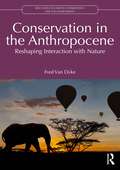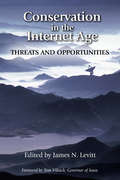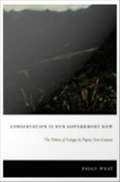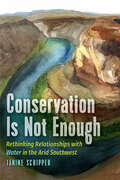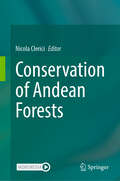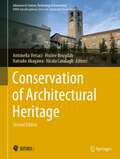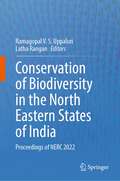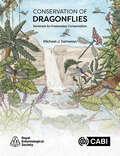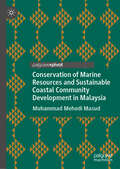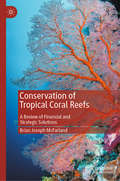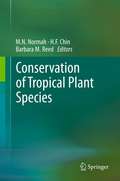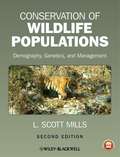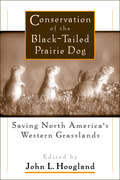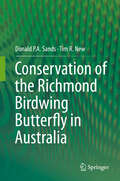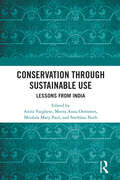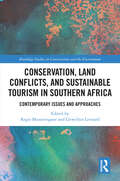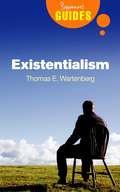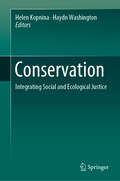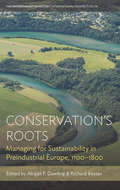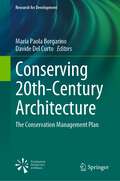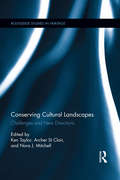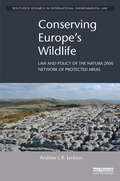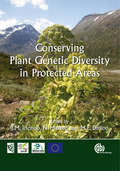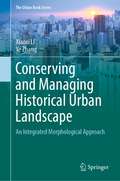- Table View
- List View
Conservation in the Anthropocene: Reshaping Interaction with Nature (Routledge Studies in Conservation and the Environment)
by Fred Van DykeThis book provides a critical assessment of conservation in the Anthropocene grounded in the personal, historical, and cultural development of human interaction with nature.The author argues that conservation can no longer be primarily about preserving nature but must adapt its efforts to promote changes through which humans create a landscape that is neither abandoned nor degraded but used well by humans and non-humans alike. The book first reviews the origin of ideas and conditions that have led to the concept and classification of the Anthropocene and explores how the author’s own interactions with nature were shaped through his experience as a conservation biologist. Next, it considers how humans have come to be the primary drivers of ecological activity, geological events, and climate change. Chapters then focus on the need for new conservation thinking regarding novel ecosystems, urban conservation, the role of Indigenous Peoples in conservation, and the value of protected areas (PAs), parks, and wilderness. The book concludes by identifying strategies for effective conservation and argues for a new formulation of conservation values that redefine human relationships and interaction with nature. Chapters are enlivened by the personal experiences of the author and the first-person narratives of conservation activists and scientists throughout the world who are learning to practice and succeed in conservation efforts under Anthropogenic conditions.Drawing on global examples, this book will be of great value to students and scholars of biodiversity conservation and environmental science ready to consider a new way of looking at the care and nurture of nature in the Anthropocene.
Conservation in the Internet Age: Threats and Opportunities
by Tom Vilsack James N. LevittSince the earliest days of our nation, new communications and transportation networks have enabled vast changes in how and where Americans live and work. Transcontinental railroads and telegraphs helped to open the West; mass media and interstate highways paved the way for suburban migration. In our own day, the internet and advanced logistics networks are enabling new changes on the landscape, with both positive and negative impacts on our efforts to conserve land and biodiversity. Emerging technologies have led to tremendous innovations in conservation science and resource management as well as education and advocacy efforts. At the same time, new networks have been powerful enablers of decentralization, facilitating sprawling development into previously undesirable or inaccessible areas.Conservation in the Internet Age offers an innovative, cross-disciplinary perspective on critical changes on the land and in the field of conservation. The book:provides a general overview of the impact of new technologies and networksexplores the potentially disruptive impacts of the new networks on open space and biodiversitypresents case studies of innovative ways that conservation organizations are using the new networks to pursue their missionsconsiders how rapid change in the Internet Age offers the potential for landmark conservation initiativesConservation in the Internet Age is the first book to examine the links among land use, technology, and conservation from multiple perspectives, and to suggest areas and initiatives that merit further investigation. It offers unique and valuable insight into the challenges facing the land and biodiversity conservation community in the early twenty-first century, and represents an important new work for policymakers, conservation professionals, and academics in planning, design, conservation and resource management, policy, and related fields.
Conservation is Our Government Now: The Politics of Ecology in Papua New Guinea
by Paige WestA significant contribution to political ecology, Conservation Is Our Government Now is an ethnographic examination of the history and social effects of conservation and development efforts in Papua New Guinea. Drawing on extensive fieldwork conducted over a period of seven years, Paige West focuses on the Crater Mountain Wildlife Management Area, the site of a biodiversity conservation project implemented between 1994 and 1999. She describes the interactions between those who ran the program--mostly ngo workers--and the Gimi people who live in the forests surrounding Crater Mountain. West shows that throughout the project there was a profound disconnect between the goals of the two groups. The ngo workers thought that they would encourage conservation and cultivate development by teaching Gimi to value biodiversity as an economic resource. The villagers expected that in exchange for the land, labor, food, and friendship they offered the conservation workers, they would receive benefits, such as medicine and technology. In the end, the divergent nature of each group's expectations led to disappointment for both. West reveals how every aspect of the Crater Mountain Wildlife Management Area--including ideas of space, place, environment, and society--was socially produced, created by changing configurations of ideas, actions, and material relations not only in Papua New Guinea but also in other locations around the world. Complicating many of the assumptions about nature, culture, and development underlying contemporary conservation efforts, Conservation Is Our Government Now demonstrates the unique capacity of ethnography to illuminate the relationship between the global and the local, between transnational processes and individual lives.
Conservation is not Enough: Rethinking Relationships with Water in the Arid Southwest
by Janine SchipperConservation Is Not Enough reconsiders the most basic assumptions about water issues in the Southwest, revealing why conservation alone will not lead to a sustainable water future. The book undertakes a thorough examination of the prevailing “conservation ethos” deeply ingrained in the culture, critically analyzing its historical roots and shedding light on its problems and inherent limitations. Additionally, it explores deep ecology and an Indigenous water ethos, offering radically different ways of understanding and experiencing water. Using an exploratory and qualitative approach, the book draws on more than ninety-five interviews conducted over three years, revealing the complex relationships people have with water in the Southwest, and prominently features the voices of participants, effectively illustrating multiple perspectives and diverse ways of thinking about and relating to water. Schipper highlights various perspectives—including a water manager making conservation decisions, a Hopi elder emphasizing our connection to the water cycle, and a ski instructor reflecting on human-made snow—and interweaves personal experiences and reflections on her own relationship with water and conservation efforts. Conservation Is Not Enough encourages readers to reflect on their personal connections to water and consider new possibilities, and it also urges readers to think beyond conventional conservation approaches. This book helps to transform the collective approach to water and cultivate fresh ways of engaging with and relating to water and is of great interest to scholars, students, and residents concerned with water issues in the Colorado River Basin.
Conservation of Andean Forests
by Nicola ClericiThis book addresses recent and novel studies with ecological and conservation relevance of forest ecosystems in the Andes. It provides new insights in a multi-scale perspective into forest management, landscape connectivity changes, forest biomass patterns and species composition, and biological invasions of Andean forests, in a context of anthropogenic disturbance and global change. The studies cover gradients of forest ecosystems from Venezuela to southern Chile.
Conservation of Architectural Heritage (Advances in Science, Technology & Innovation)
by Hocine Bougdah Natsuko Akagawa Antonella Versaci Nicola CavalagliThis book focuses on the management and conservation of architectural heritage with the aim of increasing awareness about the value of such conservation and of saving what is left of history, which in turn rewards societies by supporting the tourism industry, generating economic return, and preserving communities’ identities.Since it has become an essential need to manage and conserve the architectural heritage in order to protect the identity and heritage of a city, there appeared a gap between the theory and its application. Therefore, a considerable amount of attention has been directed by experts in this field toward emphasizing the contribution of heritage conservation in order to inspire the development of imaginative, useful high-quality design.
Conservation of Biodiversity in the North Eastern States of India: Proceedings of NERC 2022
by Ramagopal V. S. Uppaluri Latha RanganThis volume presents part of the proceedings of NERC 2022, with an emphasis on conservation of bio-diversity in North-east India. This is a highly challenging and involved topic due to regionally diverse physiographic, geographical and eco-climatic conditions. Henceforth, systemic and holistic frameworks are required to disseminate upon the potential of science and technology for the conservation of the region’s bio-diversity. Notable among these frameworks refers to plant, microbial and animal bio-diversity conservation, value-added product development and sharing the benefits of such research for the perspective of bio-prospects, analysing critical environmental and climatic factors and their sensitivity upon urbanization strategies. Tools that are to be deployed for such insights involve plant, animal, and microbial bioscience and biotechnology, generalized rules for product design and development and survey based strategies. Addressing relevant competent methodologies and generic pedagogies, this volume on the bio-diversity conservation in North-eastern states of India aims to demonstrate the potential of pragmatic strategies that can be applied for the bio-diversity conservation in any region of world. Thereby, opportunities for nature linked livelihood security can be sought for the long term wellbeing of the humankind and ecology.
Conservation of Dragonflies: Sentinels for Freshwater Conservation
by Dr Michael J SamwaysDragonflies are among the most familiar and popular of all insects, deeply embedded in human cultural history. They are iconic and tell us much about the environments in which we and they live. Their conservation is an important part of biodiversity conservation. One modern dragonfly species is listed as extinct, with many others currently threatened. It is now essential to increase conservation efforts towards saving these threatened species, with strategies now available for doing this. Recovery of dragonfly populations goes hand in hand with improvements to both freshwater conditions and bank vegetation quality. In contrast, some other dragonfly species have benefitted greatly from human transformation of the landscape, with artificial ponds in particular, increasing the population levels of many species. In turn, climate change is seeing many geographical range shifts. Dragonflies are variously sensitive to the health of freshwater systems, and the quality of vegetation along rivers and around ponds. Dragonflies are excellent indicators in these times of great concern over the quality of our freshwater supplies. Their wide range of sensitivities enables us to measure the extent to which freshwater ecosystems are either deteriorating or are improving when we undertake restoration. They enable us to gauge how well we are conserving freshwaters, whether ponds and lakes, streams or rivers. They are also good umbrellas for many other freshwater inhabitants, which altogether reflect the health of a freshwater system. Conservation of Dragonflies: Sentinels for Freshwater Conservation is for naturalists, citizen scientists, entomologists and conservation scientists, as well as practitioners and policy makers around the world.
Conservation of Marine Resources and Sustainable Coastal Community Development in Malaysia
by Muhammad Mehedi MasudThis book addresses a timely and compelling emerging issue related to the conservation and sustainable use of marine resources and the sustainable development of the coastal community. Marine protected areas (MPAs) make a remarkable contribution to the protection of marine communities by providing sustainable livelihoods, deriving financial benefits from the development of fisheries and tourism, as well as by restoring ocean productivity and preventing further environmental degradation. These areas have been considered the cornerstone of a blue economy due to their substantial economic, social and environmental contributions. However, MPAs around the world are severely hampered by a multitude of issues and challenges such as inefficient management, poor socioeconomic conditions and environmental degradation due to human activities, overexploitation of marine resources, degradation of water quality, massive waste production and climate change. These are the main obstacles to economic, social and environmental sustainability. Hence, a collaborative management approach and an integrated management policy framework is urgently needed for the economic, social, political, cultural, technological, and ecological development of coastal communities.
Conservation of Tropical Coral Reefs: A Review of Financial and Strategic Solutions
by Brian Joseph McFarlandThis book critically engages with how the conservation of tropical coral reefs is financed. Beginning with the context of tropical coral reef degradation and loss, alongside an overview of tropical ecology, global environmental policy and finance, the book reviews several conservation financing instruments. These include ecotourism, debt-for-nature swaps, impact investments, and government domestic budgetary expenditures. From the Great Barrier Reef, to the Coral Triangle, to the Mesoamerican Reef, tropical coral reef degradation and loss are serious global environmental issues, contributing to loss revenue and food insecurity for coastal communities, and species extinction. Yet, many leading companies, individuals, and governments are making a positive impact on tropical coral reef conservation through the use of conservation finance. Conservation of Tropical Coral Reefs, using 30 case studies which span 23 countries and 6 continents, tells the history of international conservation finance and provides a variety of options for individuals, businesses, and governments to support conservation financing projects.
Conservation of Tropical Plant Species
by M. N. Normah H. F. Chin Barbara M. ReedThe book is designed to provide a review on the methods and current status of conservation of the tropical plant species. It will also provide the information on the richness of the tropical plant diversity, the need to conserve, and the potential utilization of the genetic resources. Future perspectives of conservation of tropical species will be discussed. Besides being useful to researchers and graduate students in the field, we hope to create a reference for a much wider audience who are interested in conservation of tropical plant diversity.
Conservation of Wildlife Populations: Demography, Genetics, and Management
by L. Scott MillsPopulation ecology has matured to a sophisticated science with astonishing potential for contributing solutions to wildlife conservation and management challenges. And yet, much of the applied power of wildlife population ecology remains untapped because its broad sweep across disparate subfields has been isolated in specialized texts. In this book, L. Scott Mills covers the full spectrum of applied wildlife population ecology, including genomic tools for non-invasive genetic sampling, predation, population projections, climate change and invasive species, harvest modeling, viability analysis, focal species concepts, and analyses of connectivity in fragmented landscapes. With a readable style, analytical rigor, and hundreds of examples drawn from around the world, "Conservation of Wildlife Populations (2nd ed)" provides the conceptual basis for applying population ecology to wildlife conservation decision-making. Although targeting primarily undergraduates and beginning graduate students with some basic training in basic ecology and statistics (in majors that could include wildlife biology, conservation biology, ecology, environmental studies, and biology), the book will also be useful for practitioners in the field who want to find - in one place and with plenty of applied examples - the latest advances in the genetic and demographic aspects of population ecology. Additional resources for this book can be found at: www.wiley.com/gomillswildlifepopulations.
Conservation of the Black-Tailed Prairie Dog: Saving North America's Western Grasslands
by John HooglandPrairie dogs and the grassland habitat in which they play a key ecological role have declined precipitously over the past two centuries. The current number of prairie dogs is believed to be less than 2 percent of the number encountered by Lewis and Clark in the early 1800s, and only a fraction of grassland ecosystem remains. Conservation of the Black-Tailed Prairie Dog offers specific information to help scientists and managers develop rigorous plans for ensuring the long-term survival of the prairie dog and its habitat. With contributions from thirty leading biologists who are actively working to save prairie dogs, the book addresses a range of pivotal issues including: the ecology and social behavior of prairie dogs; the prairie dog's role as a keystone species; factors that have led to drastic population declines; practical solutions for protecting the prairie dog and its grassland ecosystem; and concerns of farmers and ranchers who view prairie dogs as a nuisance and a threat to their livelihoods Extensively illustrated with tables, figures, photos, and charts, and thoroughly referenced with more than 700 citations, the book is a unique and vital contribution for anyone concerned with prairie dogs, prairie dog conservation, or the conservation and management of grassland ecosystems.
Conservation of the Richmond Birdwing Butterfly in Australia
by Tim R. New Donald P.A. SandsThis survey of one the longest insect conservation campaigns in Australia deals with recovery of one of the most iconic endemic butterflies, the Richmond birdwing, threatened by clearance and fragmentation of subtropical rainforest in eastern Australia and the spread of an alien larval food-plant. Its conservation has involved many aspects of community involvement, developed over more than 20 years, and focused on habitat restoration and weed eradication, in conjunction with conservation of remaining forest fragments. The work has involved the entire historical range of the butterfly, addressed threats and emphasised landscape connectivity, and has enhanced recovery through extensive plantings of native food plants. Interest has been maintained through extensive publicity, community education and media activity, and the programme has provided many lessons for advancing insect conservation practice in the region.
Conservation through Sustainable Use: Lessons from India
by Anita Varghese Meera Anna Oommen Mridula Mary Paul Snehlata NathThe human use of nature is a polarizing topic in India and across the globe, often perceived as contradictory to traditional exclusionary conservation. However, India’s natural landscapes serve as important sources of biological resources for many communities. This collection of case studies on sustainable use practices throughout India aims to identify the policies, management strategies, and knowledge contexts that contribute to resource use without damaging biological diversity. Through a diverse array of personal accounts, stories and photographs from the field, and ongoing research studies across biogeographic zones, readers will connect with academics, practitioners, managers, and policy analysts who challenge us to rethink the conservation paradigm. These chapters provide a reflection on the history of conservation and sustainable use in India and illuminate a path towards a local and global future in which biodiversity and human well-being go hand in hand. The wide variety of authors in this book reflects the broad audience this book will be of interest to, from students studying environmental conservation and sustainability to researchers, practitioners, and policymakers who work in the field and seek to learn about successful sustainable use systems and resulting lessons that have widespread application. This book will appeal to readers interested in the areas of environment sciences, biodiversity management, sustainable development, developmental studies, forestry, wildlife and protected area management, public policy, environmental policy, and governance.
Conservation, Land Conflicts and Sustainable Tourism in Southern Africa: Contemporary Issues and Approaches (Routledge Studies in Conservation and the Environment)
by Regis Musavengane and Llewellyn LeonardThis book examines the nexus between conservation, land conflicts and sustainable tourism approaches in Southern Africa, with a focus on equity, access, restitution and redistribution. While Southern Africa is home to important biodiversity, pristine woodlands and grasslands, and is a habitat for important wildlife species, it is also a land of contestations over its natural resources with a complex historical legacy and a wide variety of competing and conflicting issues surrounding race, cultural and traditional practices and neoliberalism. Drawing on insights from conservation, environmental and tourism experts, this volume presents the nexus between land conflicts and conservation in the region. The chapters reveal the hegemony of humans on land and associated resources including wildlife and minerals. By using social science approaches, the book unites environmental, scientific, social and political issues as it is imperative we understand the holistic nature of land conflicts in nature-based tourism. Discussing the management theories and approaches to community-based tourism in communities where there is or were land conflicts is critical to understanding the current state and future of tourism in African rural spaces. This volume determines the extent to which land reform impacts community-based tourism in Africa to develop resilient destination strategies and shares solutions to existing land conflicts to promote conservation and nature-based tourism. The book will be of great interest to students, academics, development experts, and policymakers in the field of conservation, tourism geography, sociology, development studies, land use and environmental management and African studies.
Conservation: A Beginner's Guide (Beginner's Guides)
by Paul Jepson Richard LadleThe need to protect nature has never been so pressing. As unprecedented environmental challenges threaten to wipe out many of the planet's species, there is a battle against time to formulate new ways of defending nature. Jepson and Ladle cover all aspects of modern conservation from inspiring successes to the most urgent crises, introduce exciting new techniques such as re-wilding and adaptive management, and explain how we can all contribute. Essential reading for anyone who does not want to see the last of pandas, polar bears, and parrots. Dr. Paul Jepson and Dr. Richard Ladle both work at the University of Oxford.
Conservation: Integrating Social and Ecological Justice (Routledge Explorations In Environmental Studies)
by Helen Kopnina Haydn WashingtonThis book provides keys to decrypt current political debates on the environment in light of the theories that support them, and provides tools to better understand and manage environmental conflicts and promote environmentally friendly behaviour. As we work towards global sustainability at a time when efforts to conserve biodiversity and combat climate change correspond with land grabs by large corporations, food insecurity, and human displacement. While we seek to reconcile more-than-human relations and responsibilities in the Anthropocene, we also struggle to accommodate social justice and the increasingly global desire for economic development. These and other challenges fundamentally alter the way social scientists relate to communities and the environment. This book takes as its point of departure today’s pressing environmental challenges, particularly the loss of biodiversity, and the role of communities in protected areas conservation. In its chapters, the authors discuss areas of tension between local livelihoods and international conservation efforts, between local communities and wildlife, and finally between traditional ways of living and ‘modernity’. The central premise of this book is while these tensions cannot be easily resolved they can be better understood by considering both social and ecological effects, in equal measure. While environmental problems cannot be seen as purely ecological because they always involve people, who bring to the environmental table their different assumptions about nature and culture, so are social problems connected to environmental constraints. While nonhumans cannot verbally bring anything to this negotiating table, aside from vast material benefits that society relies on, the distinct perspective of this book is that there is a need to consider the role of nonhumans as equally important stakeholders – albeit without a voice. This book develops an argument that human-environmental relationships are set within ecological reality and ecological ethics and rather than being mutually constitutive processes, humans have obligate dependence on nature, not vice versa. This would enable an ethical position encompassing the needs of other species and giving simultaneous (without one being subordinated to another) consideration to justice for humans and non-humans alike. The book is accessible to both social scientists and conservation specialists, and intends to contribute to strengthening interdisciplinary collaborations in the field of conservation.
Conservation’s Roots: Managing for Sustainability in Preindustrial Europe, 1100–1800 (Environment in History: International Perspectives #19)
by Abigail P. Dowling Richard KeyserThe ideas and practices that comprise “conservation” are often assumed to have arisen within the last two centuries. However, while conservation today has been undeniably entwined with processes of modernity, its historical roots run much deeper. Considering a variety of preindustrial European settings, this book assembles case studies from the medieval and early modern eras to demonstrate that practices like those advocated by modern conservationists were far more widespread and intentional than is widely acknowledged. As the first book-length treatment of the subject, Conservation’s Roots provides broad social, historical, and environmental context for the emergence of the nineteenth-century conservation movement.
Conserve It! (Saving Our Planet)
by Mary BooneIntroduces early readers to environmentalist concepts including drought, water conservation, and wetlands conservation, and what they can do to help the environment. Features real-life examples of kids who have made a difference.
Conserving 20th-Century Architecture: The Conservation Management Plan (Research for Development)
by Maria Paola Borgarino Davide Del CurtoThis book offers an international overview of how to apply the Conservation Management Plan (CMP) to the 20th-century architectural heritage. Although the CMP is universally considered a fundamental tool for sustainable management of the built heritage, the application to 20th-century buildings is still limited. The book illustrates selected case studies from different countries to discuss how best to preserve the authenticity of the original materials, manage changes in use, engage users and stakeholders in this process, and make conservation and sustainability work together. "Conserving 20th-century architecture" will provide insights for scholars and students and assist architects in drafting an effective conservation management plan.
Conserving Cultural Landscapes: Challenges and New Directions (Routledge Studies In Heritage Ser.)
by Ken Taylor, Archer Clair and Nora J. MitchellNew approaches to both cultural landscapes and historic urban landscapes increasingly recognize the need to guide future change, rather than simply protecting the fabric of the past. Challenging traditional notions of historic preservation, Conserving Cultural Landscapes takes a dynamic multifaceted approach to conservation. It builds on the premise that a successful approach to urban and cultural landscape conservation recognizes cultural as well as natural values, sustains traditional connections to place, and engages people in stewardship where they live and work. It brings together academics within the humanities and humanistic social sciences, conservation and preservation professionals, practitioners, and stakeholders to rethink the meaning and practice of cultural heritage conservation, encourage international cooperation, and stimulate collaborative research and scholarship.
Conserving Europe's Wildlife: Law and Policy of the Natura 2000 Network of Protected Areas (Routledge Research in International Environmental Law)
by Andrew L.R. JacksonThe Natura 2000 network of protected areas is the centrepiece of European Union nature policy, currently covering almost one-fifth of the EU’s entire land territory plus large marine areas. This vast EU-wide network, which aims to conserve Europe’s most valuable and threatened species and habitats, has major impacts on land use throughout all Member States of the EU. This book critically assesses the origins and implementation of the Natura 2000 network, established under the Birds Directive of 1979 and the Habitats Directive of 1992. Based on original archival research and interviews with key participants, the book records a detailed history of the origins and negotiation of Natura 2000 policy and law, with the history of EU environmental policy provided as a framework. An historical institutionalist approach is adopted, which emphasises the importance of understanding legal and policy development as processes that unfold over time. Three phases in the history of EU environmental policy are identified and described, and the history of EU nature policy is placed within the context of these three phases. Informed by this history, the author presents a comprehensive summary and assessment of the law and policy that protects Natura 2000 sites at EU level, and reviews the nature conservation outcomes for the targeted species and habitats. The book reveals how a knowledge of the history of Natura 2000 enriches our understanding of key issues such as conflicts in establishing and conserving the Natura 2000 network, EU integration in the field of nature conservation, and the future of EU nature policy.
Conserving Plant Genetic Diversity in Protected Areas: Population Management of Crop Wild Relatives
by Nigel Maxted Mohammad Ehsan Dulloo José María IriondoRather than the usual focus on rare or endangered plants and ex situ efforts in conserving plant biodiversity, Iriondo (biodiversity and conservation, U. Rey Juan Carlos, Madrid, Spain) and the co-editors are devoted to the conservation of the genetic diversity of crop wild relatives in their natural environments. After presenting the increasingly urgent rationale for such conservation efforts, contributors to seven chapters address international/national initiatives including integrating efforts to maintain plant diversity with protected area management, issues in reserve location and design, monitoring technologies, and habitat recovery techniques. The volume includes highlighted case studies, and color plates of plants, interaction with local peoples for successful wild relative crop conservation, monitoring activities, a gene bank, and native plant nursery. Annotation ©2008 Book News, Inc., Portland, OR (booknews.com)
Conserving and Managing Historical Urban Landscape: An Integrated Morphological Approach (The Urban Book Series)
by Xiaoxi Li Ye ZhangThis book focuses on urban morphology and its application to urban conservation and management. The rapid disappearance of historical urban landscapes, especially in developing countries, is largely attributed to the lack of historic awareness and broad-brush demolition and redevelopment in urban development. The book provides a new, integrated morphological approach that enables fine-grained and cross-scale examination of urban form based on both its historicity and socio-economic potential, with the aims of informing more responsive and context-specific conservation and management of historical urban landscapes. The robustness of this new approach and the feasibility of its application to urban conservation practice are tested and demonstrated by three case studies in drastically different cultural contexts, namely Ludlow, a medieval town in the UK, Chinatown in Singapore and a historic quarter in Nanjing, China. Combining historico-geographical and configurational approaches, the book also makes a significant breakthrough in terms of coordinating and synthesizing different traditions of urban morphology, which has been a key challenge to this field over the past decades. In addition, by using multi-source data, ranging from conventional cartographic maps to computer-generated and open online data, the integrated approach innovatively relates qualitative and quantitative aspects of urban form and links the qualitative and quantitative analyses of formal structure. As an interdisciplinary study merging geography, urban history, urban planning and design, this book is to be primarily used as a reference book for graduate students and scholars in various fields who are interested in urban form and urban conservation and management. In addition, it offers practitioners in urban planning and design a useful tool for managing changes in historical urban landscapes. Lastly, it contributes to developing a common platform to facilitate dialogues among various stakeholders and participants in urban conservation practice.
